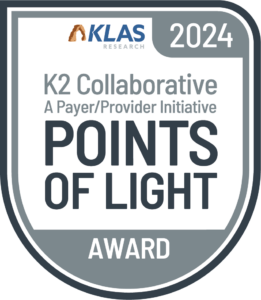eHealth Exchange is identified as an influential convener advancing the HL7® Fast Healthcare Interoperability Resources® (FHIR®) standard by independent analyst firm KLAS Research.
is identified as an influential convener advancing the HL7® Fast Healthcare Interoperability Resources® (FHIR®) standard by independent analyst firm KLAS Research.
The KLAS “Points of Light 2024 Case Study 18: Automating Prior Authorizations through Networked FHIR Connections” highlights how eHealth Exchange convened hospital systems such as UC Davis Health, payers such as Regence, other Qualified Health Information NetworksTM (QHINs™), and the HL7® Da Vinci Project “to facilitate faster, easier data sharing through FHIR technology.”
“We continue to support an open and shared approach to solving payer and health exchange challenges, and this case study demonstrates how we consistently work together with key stakeholders to advance FHIR,” said Jay Nakashima, president of eHealth Exchange. “Together we can advance interoperability for the public good and accelerate prior authorization determinations to administer faster patient treatment.” Nakashima continues, “This is a critical move given the January 2027 compliance deadline with the CMS Interoperability and Prior Authorization final rule (CMS-0057-F) requiring providers and payers to exchange using FHIR for prior authorization.”
The KLAS case study, released in May, points to the outcomes achieved via this strategic collaboration, stating: “The process validated that QHINs can facilitate transaction requests between payer and provider organizations to promote the scaling of interoperability solutions.” This will have a significant impact on workflows associated with payment, prior authorization, and medical review, reducing administrative burdens on both parties while expediting patient treatment.
The federally endorsed Trusted Exchange Framework and Common Agreement℠ (TEFCA℠) encourages providers and payers to exchange patient data, specifically supporting the FHIR standard first in their FHIR Roadmap and again in version 2.0 of the Common Agreement released this past month. As the largest healthcare information network in the county and a Designated QHIN TM, eHealth Exchange is paving the way for provider-payer health information exchange using Networked FHIR with its electronic data-sharing network.
eHealth Exchange recently launched an incentive program to encourage greater adoption of FHIR technology, offering to waive monthly fees for providers and payers exchanging data using FHIR according to the Da Vinci specifications. Although TEFCA participation by payers, providers, and public health agencies is currently optional, eHealth Exchange is accelerating the use of FHIR so network participants can begin reaping the benefits of this much-needed exchange now. eHealth Exchange payer and provider participants are striving to be in production with this new prior authorization process by the end of summer.